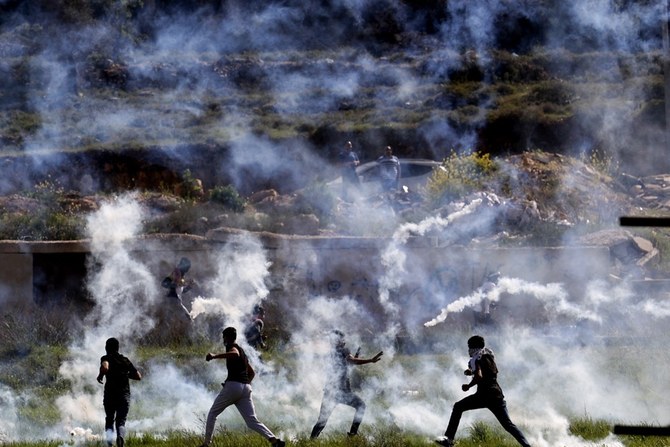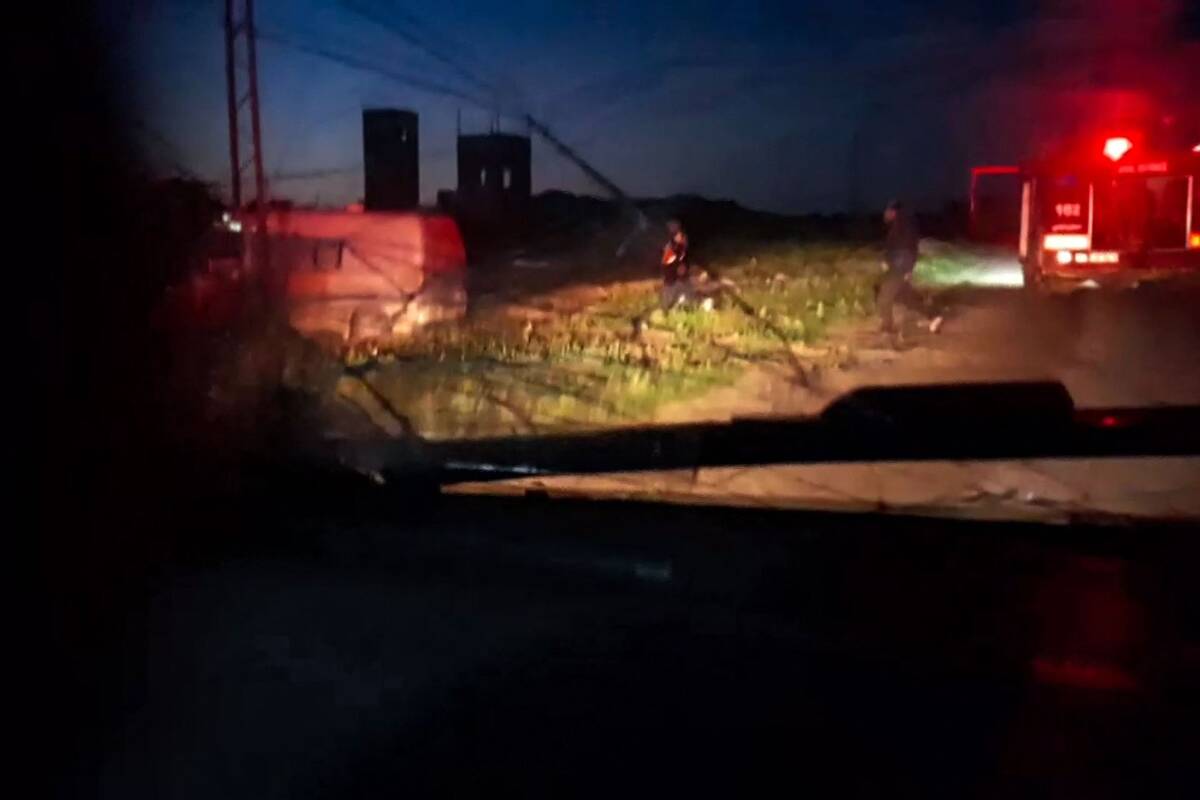LONDON: Shockwaves from Israel’s military operation in Gaza have reverberated into the West Bank and East Jerusalem, where security forces and emboldened Jewish settlers have reportedly ramped up attacks on Palestinian communities.
Since the Oct. 7 Hamas-led attack sparked the conflict in Gaza, Israeli settlers have carried out 603 attacks against Palestinians in the West Bank, expelling 1,222 people from 19 herding communities, according to UN figures.
Armed settlers have also killed at least nine Palestinians, while Israeli security forces have killed 396 others in the past few months.
Likewise, the Israeli army has intensified raids. On May 4, Israeli forces raided Tulkarem and killed five Palestinians, including four Hamas members. On April 20, Israeli forces carried out a raid in the same governorate, home to more than 6,400 refugees, killing 14 Palestinians.
Abeer, who runs a small business in Jenin, has observed a “surge in settler attacks, the proliferation of checkpoints, daily raids on Palestinian homes, infrastructure destruction, killing of Palestinian youths, and increased Israeli military airstrikes.”

The Israeli army has intensified raids in parts of the West Bank. (AFP)
While similar attacks regularly took place before Oct. 7, she told Arab News that “they have doubled and become more horrific” since the onset of the Gaza war.
Jenin “has for about two years been specifically a target for the Israeli military, as it’s home to a few resistance groups,” she added.
According to a report by the UN Human Rights Office published in March, the “drastic acceleration” of long-standing patterns of discrimination, oppression, and violence against Palestinians has pushed the West Bank to the “brink of catastrophe.”
Israel, at “one of the fastest rates on record,” has demolished 917 Palestinian-owned structures in the West Bank since Oct. 7, displacing 1,015 Palestinians. Of these structures, 210 are in East Jerusalem and 285 are residential buildings, the report added.
Yasmeen El-Hasan, international advocacy officer at the Union of Agricultural Work Committees, a nongovernmental organisation supporting rural Palestinian communities, described the situation in the West Bank as “absolutely horrendous.”
“The Israeli expansion of its settler colonial enterprise in the West Bank is happening parallel to the genocidal war on Gaza,” she told Arab News.
“The occupation has established numerous new settler outposts, settler roads within the West Bank,” she said, adding that the Israeli government “has approved thousands of new settler units within the West Bank.”

Since Oct. 7, Israeli settlers have carried out 603 attacks against Palestinians in the West Bank (AFP)
While casualties from Israeli violence in the West Bank have not reached the scale of those in Gaza, she said the “intensity of Israeli settler colonial violence in every part of historic Palestine has amplified, increased, been exacerbated in the past six months.”
The “impunity” granted by Israeli authorities has further emboldened Jewish settlers in the West Bank, El-Hasan said.
Settlers attacking Palestinian communities are “increasingly armed by the government of the Israeli occupation and there are no consequences for what they’re doing,” she said.
Addressing the 55th session of the Human Rights Council in March, Nada Al-Nashif, the UN deputy high commissioner for human rights, said that after Oct. 7, the OHCHR documented “cases of settlers wearing full or partial Israeli army uniforms and carrying army rifles, harassing and attacking Palestinians, including shooting at them at point-blank range.”
She also said that by Oct. 31, Israeli security forces had reportedly distributed about 8,000 weapons to “settlement defense squads” and “regional defense battalions” in the West Bank.
INNUMBERS
• 700,000 Israeli settlers in the West Bank and East Jerusalem.
• 300 Illegal settlements or outposts on Palestinian territory.
Source: OHCHR
An incident in which the Israeli military purportedly enabled settler violence took place in mid-April, when about 50 settlers attacked the northern West Bank village of Aqraba “protected by the Israeli occupation army,” according to WAFA, the Palestinian news agency.
Two Palestinians were killed in the settler attack, according to the mayor of the village, Salah Bani Jaber, who witnessed the incident. He said the Israeli soldiers at the scene “stood idly, watching the settlers.”
“The absence of accountability for settler violence is a key factor in the ongoing coercive environment,” Al-Nashif told the president of the UN Human Rights Council.

The “drastic acceleration” of long-standing patterns of discrimination, oppression, and violence against Palestinians has pushed the West Bank to the “brink of catastrophe,” said a UN report. (AFP)
She described this lack of accountability as a “manifestation of a dual system of criminal justice that has had discriminatory effects on Palestinians.”
Yesh Din, an Israeli NGO that documents abuses by Israeli civilians against Palestinians in the occupied territories, concluded in its December data sheet that “the Israeli-law enforcement system fails in fulfilling its duty to protect Palestinians from Israeli violence.”
The report emphasized that the continuation of “this systemic failure” for at least two decades “evinces that the State of Israel normalizes and supports ideologically motivated violence perpetrated by Israeli settlers against Palestinians in the West Bank.”
The data sheet showed that in the past 20 years, 93.7 percent of all police investigations into settler offenses against Palestinians were closed without an indictment, while only 3 percent led to a full or partial conviction.
Yesh Din also noted that Palestinians tend to mistrust Israeli authorities, making victims of settler violence reluctant to report offenses.

In July last year, at least 3,000 Palestinians fled their homes in the Jenin refugee camp after a large Israeli military operation. (AFP)
Between January and September 2023, more than 57 percent of the victims chose not to file a complaint. Of these, 54 percent said they feared retaliation or did not trust the Israeli authorities to apprehend offenders.
Palestinians in the West Bank’s rural areas are particularly vulnerable to expulsion from their lands by Jewish settlers.
El-Hasan of UAWC said: “Israeli settlers, often accompanied by or protected by the Israeli occupation forces, very frequently target Palestinian agricultural lands and critical infrastructure, as well as the communities.
“This includes vital resources like water wells, roads, greenhouses, sanitary facilities, land where crops are grown, herds, herding enclosures, cars, and houses.”
The OHCHR report found that from January 2022 to early September 2023, 1,105 Palestinians from 28 herding communities (about 12 percent) were forcibly displaced due to settler violence and prevention of access to grazing land.
Palestinian farmers and rural communities in Area C, which constitutes 61 percent of the West Bank territory, have been specifically targeted by Israeli settlers, El-Hasan said.
“Area C is the majority of the West Bank, the most resource rich, and it’s also, according to the Oslo Accords, under Israeli military and civil administration,” she added.

Israeli security forces have killed 396 Palestinians in the West Bank in the past few months. (AFP)
The Oslo Accords, signed on the White House lawn in September 1993, were the first direct peace agreement between Israeli authorities and the Palestinian Liberation Organization. They sought to pave the way for a two-state solution to the Israeli-Palestinian dispute.
Stressing the importance of talking about Area C in the context of Israeli settlement expansion, El-Hasan pointed out that this “very fertile” area is “directly tied to Palestinian livelihood.”
It is “where most of the settlements are,” she explained, adding that “the Israeli occupation is trying its hardest to take” this area.
“Land and livelihood are directly tied to Palestinian food systems. This targeted disruption and destruction of Palestinian food systems is a tactical strategy of Israeli settler colonialism that is attempting to sever the indigenous relationship with interdependence on the land, no matter the consequences.
“And that includes humanitarian targeting, like the tens of thousands of murdered Palestinians, or environmental, like the hundreds of thousands of metric tons of planet-warming emissions produced by Israel in the past few months.”
On April 29, Washington said five Israeli security force units committed “gross violations of human rights” against Palestinians in the West Bank before Oct. 7, yet it has not barred any of the units from receiving US military support, Reuters reported.

The Oslo Accords sought to pave the way for a two-state solution to the Israeli-Palestinian dispute. (AFP)
On May 3, two “extremist” groups and four individuals in Israel who it blamed for violence in the West Bank, as part of a fresh package of measures against settlers.
Referring to Jewish settlers living in occupied West Bank, the office of Israeli Prime Minister Benjamin Netanyahu maintains that “the vast majority of residents of Judea and Samaria are law-abiding citizens ... Israel acts against all violators of the law in all places and therefore there is no place for drastic steps on this matter.”
In July last year, at least 3,000 Palestinians fled their homes in the Jenin refugee camp, home to about 18,000 people, after the Israeli military launched what Palestinian officials described as the largest operation in the area in two decades.

Israel has proved over the past 76 years that it “will do whatever it takes to forcibly take that land,” said Yasmeen El-Hasan. (AFP)
Israel said it was targeting a Palestinian militant command center.
Saying that “the basis of settler colonialism is land theft,” El-Hasan accused Israel of proving over the past 76 years that it “will do whatever it takes to forcibly take that land, and that includes destroying it, exploiting it, and committing genocide.”
“Palestinian communities are physically rooted in our land,” she told Arab News. “Our relationship with this land is not just symbolic, it’s symbiotic. It’s not transactional, it’s reciprocal. And as the indigenous people to this land, we are its caretakers.”





























